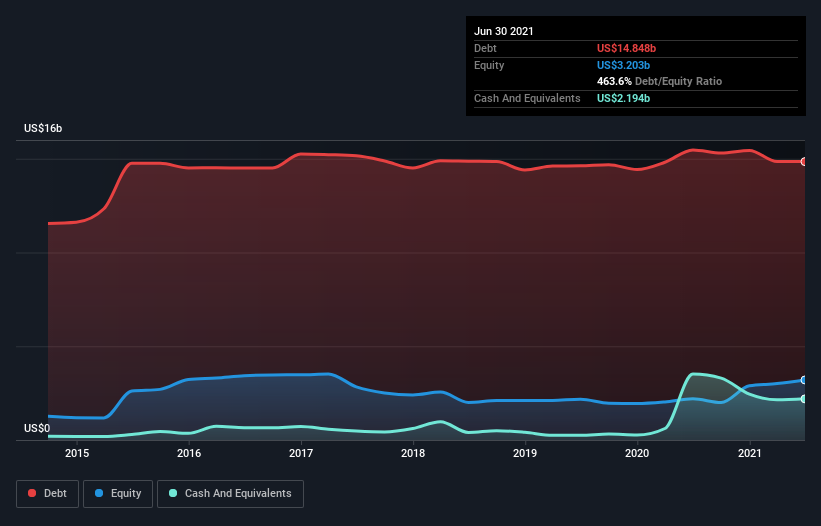Legendary fund manager Li Lu (who Charlie Munger backed) once said, ‘The biggest investment risk is not the volatility of prices, but whether you will suffer a permanent loss of capital.’ So it might be obvious that you need to consider debt, when you think about how risky any given stock is, because too much debt can sink a company. As with many other companies Tenet Healthcare Corporation (NYSE:THC) makes use of debt. But is this debt a concern to shareholders?
When Is Debt A Problem?
Generally speaking, debt only becomes a real problem when a company can’t easily pay it off, either by raising capital or with its own cash flow. Part and parcel of capitalism is the process of ‘creative destruction’ where failed businesses are mercilessly liquidated by their bankers. However, a more frequent (but still costly) occurrence is where a company must issue shares at bargain-basement prices, permanently diluting shareholders, just to shore up its balance sheet. By replacing dilution, though, debt can be an extremely good tool for businesses that need capital to invest in growth at high rates of return. The first thing to do when considering how much debt a business uses is to look at its cash and debt together.
What Is Tenet Healthcare’s Net Debt?
As you can see below, Tenet Healthcare had US$14.5b of debt at June 2021, down from US$15.5b a year prior. However, it does have US$2.19b in cash offsetting this, leading to net debt of about US$12.3b.
A Look At Tenet Healthcare’s Liabilities
According to the last reported balance sheet, Tenet Healthcare had liabilities of US$5.07b due within 12 months, and liabilities of US$18.3b due beyond 12 months. Offsetting this, it had US$2.19b in cash and US$3.14b in receivables that were due within 12 months. So its liabilities total US$18.0b more than the combination of its cash and short-term receivables.
This deficit casts a shadow over the US$7.49b company, like a colossus towering over mere mortals. So we definitely think shareholders need to watch this one closely. At the end of the day, Tenet Healthcare would probably need a major re-capitalization if its creditors were to demand repayment.
In order to size up a company’s debt relative to its earnings, we calculate its net debt divided by its earnings before interest, tax, depreciation, and amortization (EBITDA) and its earnings before interest and tax (EBIT) divided by its interest expense (its interest cover). The advantage of this approach is that we take into account both the absolute quantum of debt (with net debt to EBITDA) and the actual interest expenses associated with that debt (with its interest cover ratio).
While Tenet Healthcare’s debt to EBITDA ratio (3.9) suggests that it uses some debt, its interest cover is very weak, at 2.3, suggesting high leverage. It seems clear that the cost of borrowing money is negatively impacting returns for shareholders, of late. The good news is that Tenet Healthcare grew its EBIT a smooth 49% over the last twelve months. Like the milk of human kindness that sort of growth increases resilience, making the company more capable of managing debt. When analysing debt levels, the balance sheet is the obvious place to start. But it is future earnings, more than anything, that will determine Tenet Healthcare’s ability to maintain a healthy balance sheet going forward.
Finally, a company can only pay off debt with cold hard cash, not accounting profits. So it’s worth checking how much of that EBIT is backed by free cash flow. Over the most recent three years, Tenet Healthcare recorded free cash flow worth 71% of its EBIT, which is around normal, given free cash flow excludes interest and tax. This free cash flow puts the company in a good position to pay down debt, when appropriate.
Our View
Neither Tenet Healthcare’s ability to handle its total liabilities nor its interest cover gave us confidence in its ability to take on more debt. But the good news is it seems to be able to grow its EBIT with ease. It’s also worth noting that Tenet Healthcare is in the Healthcare industry, which is often considered to be quite defensive. Taking the abovementioned factors together we do think Tenet Healthcare’s debt poses some risks to the business. So while that leverage does boost returns on equity, we wouldn’t really want to see it increase from here. When analysing debt levels, the balance sheet is the obvious place to start.







































